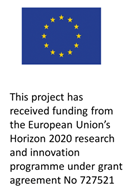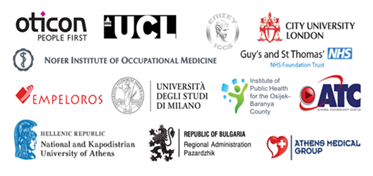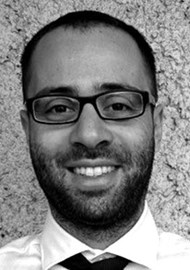
Big Data? Biosensors, smart hearing aids and smartphones? The EVOTION Project has it all and more! What will this project tell us about the future of hearing management? Doris-Eva Bamiou, Giorgos Dritsakis and Louisa Murdin, members of the EVOTION team, explain the project.
In a rapidly ageing population worldwide, the prevalence of hearing loss is on the increase and requires appropriate public health policies to prevent and address related problems and needs at population level.
The EVOTION project aims to build the evidence base for a powerful platform that will support decisions for the treatment of hearing loss and the prevention of potential hearing loss-related cognitive decline to achieve improved socioeconomic inclusion of these patients. In this article, we outline the rationale, objectives and design of the project.
“In the UK, the percentage of people suffering from HL is expected to exceed 20% of the population by 2031.”
Hearing Loss (HL) affects over 5% of the world’s population, with approximately one third of affected people over the age of 65. Its prevalence is rapidly rising due to increased noise levels and exposure in modern society and the growth and ageing of the population. The number of people with disabling HL has thus risen from 278 million in 2005 to more than 360 million in 2012 worldwide [1]. In the UK, the percentage of people suffering from HL is expected to exceed 20% of the population by 2031. Among the detrimental consequences of HL in health and wellbeing, it is also strongly associated with a higher risk of dementia, mental illness and depression [2]. HL treatment has a significant cost, which is estimated to be €213 billion per year in the EU.
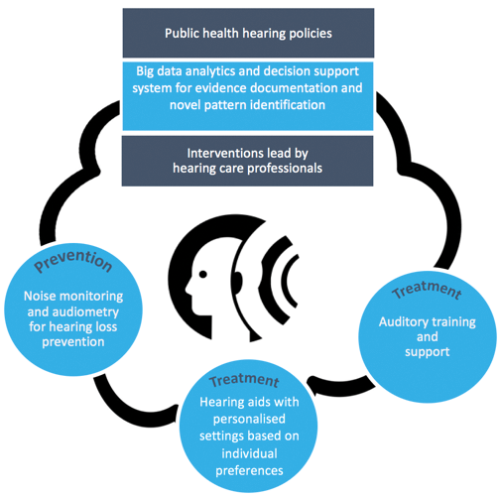
Figure 1. The EVOTION vision.
Hearing Aids (HAs), which are currently the pre-eminent management strategy for HL, are effective at improving health-related quality of life for hearing-impaired adults. However, HA users still face several challenges, such as listening in noisy environments, poor sound quality and difficulty selecting HA programmes and settings. As a result, many adults, especially elderly, do not accustom to their HA, with up to 24% of hearing aids provided not being used [3]. Optimal HA fitting should be tailored to each person’s individual needs and characteristics, as HA use and benefit are affected by a range of factors. For instance, self-reported hearing disability, age, and degree of HL are commonly reported as significant predictors of HA uptake and effectiveness [4]. In addition to these factors, a recent retrospective data-logging study found no statistical difference in HA use between patients with mild and moderate HL, with implications for the prescription of HAs for milder degrees of HL [5]. However, there are, at present, significant gaps in the knowledge that informs optimal HA fitting. There is no comprehensive study to date that has examined associations between audiological, cognitive, behavioural and physiological data, in combination with real-time environmental and HA user data collected via the HAs to examine their effect on HA use and benefit. The advent of Big Data analytical techniques in the field of information technology offers an opportunity to remedy this knowledge gap.
EVOTION is a Horizon 2020 EU-funded research project (H2020 grant agreement no. 727521). This project aims to use Big Data from HA users in order to build a platform for the formation of public health policies related to the prevention, early diagnosis, long-term treatment and rehabilitation of HL, as well as the detection and prevention of cognitive decline and the improved socioeconomic inclusion of hearing-impaired individuals. Public health policy decision models are being developed within the project, taking into account: a) factors potentially influencing the effectiveness of HL treatments; and b) ways in which this information can inform public health policy decisions. To this end, the project is also developing a public health policy-making platform that includes components enabling the static and real-time feeding of data into the EVOTION data repository.
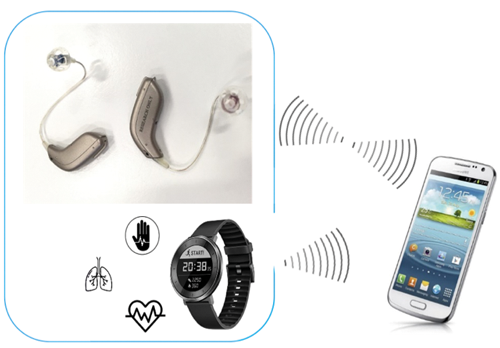
Figure 2. Components of the EVOTION platform and clinical study.
To validate these models and platform, a clinical study started earlier this year in the UK and in Greece as part of the EVOTION project [6]. This study is collecting a big set of heterogeneous data, including retrospective HA-related existing data from a big number of patients (retrospective study), and prospective clinical/self-report/quality of life data and multiple time point real-time data via smart HAs, a mobile app and biosensors (prospective study). The primary objective of the study is to feed these data into the EVOTION data repository and perform complex Big Data Analytics that will enable the validation of the EVOTION platform as a public health policymaking tool.
Other objectives of the clinical study are to:
- Identify predictors of HA use and outcome.
- Identify predictors of temporary or permanent threshold shift following noise exposure in HA users.
- Identify predictors of cognitive decline.
- Investigate benefits of self-management of HA settings.
- Investigate benefits of auditory training for HA use and outcome.
The EVOTION clinical study will consist of two parts:
Retrospective data collection: Existing HA-related data, including demographics, hearing loss levels, cause, duration, medical history and hearing aid usage data from approximately 35,000 HA users will be extracted from existing clinical repositories in the UK (University College London Hospital and Guy’s and St Thomas’ NHS Foundation Trust) and Denmark (Oticon A/S).
Prospective data collection: A total of 1260 adult HA candidates will attend routine clinical appointments including fitting with EVOTION smart HAs. They will undergo a battery of standard audiological assessments and other assessments (including measures of patient-reported HA benefit, mood, cognition, quality of life). Participants will also be issued with wearable bio-sensors and smartphone applications to enable the collection of dynamic real-life HA usage data, together with information about the different environmental and situational contexts, as well as physiological data known to correlate with listening effort. The HA that will be used in the study is a research prototype based on the commercially available Oticon OPN enabling: a) logging of HA use, volume changes, intentional and automatic program shifts and sound environment measures; and b) adjustment to the volume and programs via a paired Bluetooth connection and the mobile app.
The study will run over 24 months across four sites:
- The Royal National Throat Nose & Ear Hospital (London, UK)
- Prof Doris-Eva Bamiou and Dr Giorgos Dritsakis. - Guy’s and St Thomas’ NHS Foundation Trust (London, UK)
- Dr Louisa Murdin and Ms Nina Koloutsou. - University of Athens (Athens, Greece)
- Prof Thanos Bibas and Dr Dimitris Kikidis. - Athens Medical Centre (Athens, Greece)
- Prof George Gavalas and Ms Katherine Ploumidou.
Data will be analysed with Big Data Analytic techniques to detect patterns of (a) contextualised HA usage and effectiveness for different types of HL and (b) correlations between different factors and comorbidities affecting HL. Big data analytics will include statistics (e.g., descriptive statistics, statistical testing and inference techniques) and data mining (e.g. clustering and prediction) as required by the public health policy-making models.
“Clinicians and hearing-aid users in the study will be pioneering techniques that could benefit the hearing-impaired and could be applied to population-based health research in other medical specialties.”
To our knowledge, the EVOTION project is the first of its kind not only in audiology but also in public health. In this way, clinicians and hearing-aid users in the study will be pioneering techniques that could benefit the hearing-impaired and could be applied to population-based health research in other medical specialties.
The project is funded under the European Union’s Horizon 2020 research and innovation programme under grant agreement no. 727521. The project consists of 13 partners across seven different countries. The Scientific Coordinator of the project is Prof. Doris-Eva Bamiou (UCL Ear Institute, London) and the Technical Coordinator is Professor George Spanoudakis (CITY University, London).
SUMMARY
-
Hearing loss is one of the leading causes of Years Lived with Disability worldwide, with rising prevalence, especially among the elderly, and has detrimental consequences and cost implications.
-
The holistic management of hearing loss requires understanding of the role of several factors intrinsic to the patient or extrinsic including the sound characteristics of the various environments that the users participates in.
-
The EVOTION project will collect a big set of retrospective and prospective hearing-aid logging, audiological, cognitive, behavioural, environmental and physiological data from hearing-aid users across four sites in the UK and Greece.
-
This big data will be used to identify predictors or HA use and benefit, cognitive decline, temporary threshold shifts and auditory training benefits, and will enable the development and eventual validation of a public health policy decision making platform
References
1. WHO. Deafness and hearing loss. 2017.
www.who.int/mediacentre/factsheets/fs300/en/
Last accessed January 2018.
2. Livingston G, Sommerlad A, Orgeta V, et al. Dementia prevention, intervention, and care. The Lancet 2017;6736(17).
3. McCormack A, Fortnum H. Why do people fitted with hearing aids not wear them? International Journal of Audiology 2013;52(5):360-8.
4. Laplante-Lévesque A, Hickson L, Worrall L. What Makes Adults With Hearing Impairment Take Up Hearing Aids or Communication Programs and Achieve Successful Outcomes? Ear & Hearing 2012;33(1):79-93.
5. Timmer B, Hickson L, Launer S. Hearing Aid Use and Mild Hearing Impairment: Learnings from Big Data. Journal of American Academy of Audiology 2017;28(8): 731-41.
6. Dritsakis G, Kikidis D, Koloutsou N, et al. Clinical validation of a public health policy-making platform for hearing loss (EVOTION): protocol for a big data study BMJ Open 2018;8:e020978. doi: 10.1136/bmjopen-2017-020978.
Declaration of competing interests: None declared.
